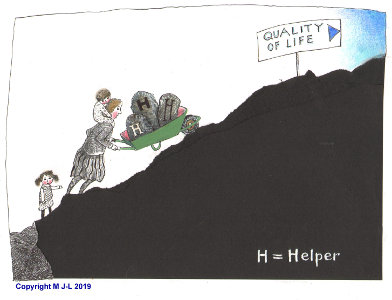Dismal early child and family support (ECI) in the UK – a massive failure of imagination, not competence

We can frame a new question that brings a more imaginative response to these children and their families
Editorial: Very many babies and pre-school children have ‘multiple disabilities’. As an educationalist, I think it is more useful to think of each of these children having a unique ‘multifaceted condition’ in which the various disabilities, impairments and conditions interact with each other. In my experience, it is not productive to address each disability separately.
The children I am thinking of have some combination of difficulties in movement, posture, dexterity, communication, cognition, vision, hearing, behaviour, social skills... They might also have a learning disability.
The big mistake we have been making is to think that a child with ‘multiple disabilities’ needs direct help from multiple practitioners.
What comes from this mistake?
- It leads to overloading babies and young children with too many non-family adults – each of whom expects the child to accept them and respond to them.
- It overloads parents with too many therapy sessions, clinics, assessments, reviews, home visits, etc, adding to their stress and exhaustion.
- By keeping child and parents so busy and stressed we impair the process of attachment.
- This knee-jerk multiple practitioner response keeps practitioners stretched to the limit.
In this additive approach, therapists, teachers and others who are supposed to be helpers, become part of the load the parents have to carry on their way to some sort of quality of life.
We can frame a new question that brings a more imaginative response to these children and their families:
If the child needs help with communication, movement, cognition, vision, etc, how can the relevant practitioners join their skills together into a whole approach that respects the rights of the child, reduces parents’ stress and does not overload busy practitioners?
This question does not threaten any practitioner’s integrity. On the contrary, it provides opportunities for practitioners to enhance their professionalism and become ever more competent in working with babies and pre-school children in their wholeness. Answering the question brings great rewards.
There does not have to be only one answer to the question. But it is a question that must, sooner or later, be addressed in the UK if we are to move beyond 20th century methods.
Peter Limbrick, June 2019.
This question is addressed fully in New book: Bringing up babies and young children who have very special needs - 8 sample pages
Cartoon from TAC Bulletin 247
 Peter Limbrick is available to visit professional teams and parent groups to discuss early child and family support and to help develop new systems.
Peter Limbrick is available to visit professional teams and parent groups to discuss early child and family support and to help develop new systems.
Contact: This email address is being protected from spambots. You need JavaScript enabled to view it.

